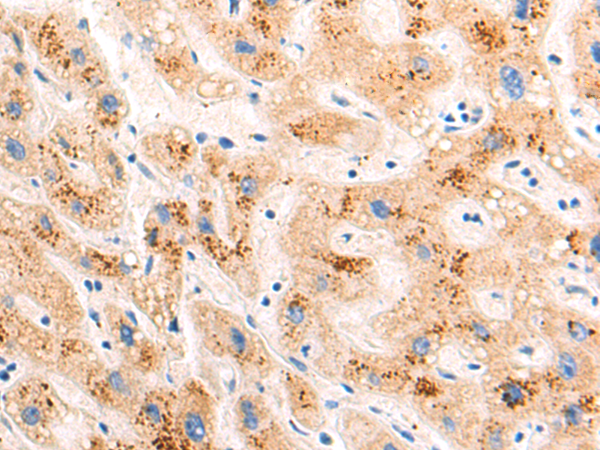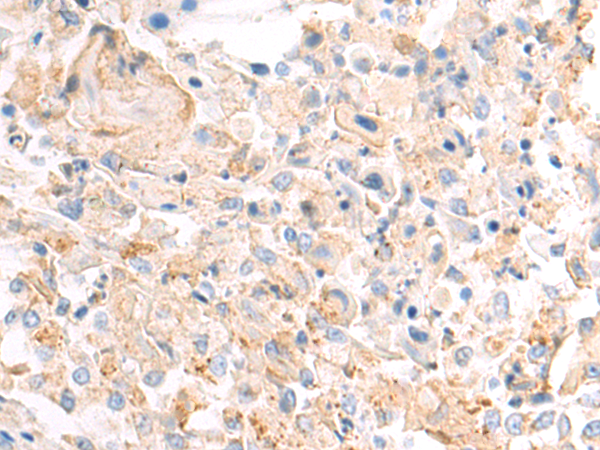

| WB | 咨询技术 | Human,Mouse,Rat |
| IF | 咨询技术 | Human,Mouse,Rat |
| IHC | 1/50-1/200 | Human,Mouse,Rat |
| ICC | 技术咨询 | Human,Mouse,Rat |
| FCM | 咨询技术 | Human,Mouse,Rat |
| Elisa | 1/5000-1/10000 | Human,Mouse,Rat |
| Aliases | BDK; BCKDKD |
| Host/Isotype | Rabbit IgG |
| Antibody Type | Primary antibody |
| Storage | Store at 4°C short term. Aliquot and store at -20°C long term. Avoid freeze/thaw cycles. |
| Species Reactivity | Human |
| Immunogen | Fusion protein of human BCKDK |
| Formulation | Purified antibody in PBS with 0.05% sodium azide and 50% glycerol. |
+ +
以下是3条与BCKDK抗体相关的代表性文献(部分内容基于研究背景概括整理,建议核实原文):
---
1. **文献名称**: "Antisense Inhibition of BCKDK (Branched-chain α-Ketoacid Dehydrogenase Kinase) as a Treatment for Maple Syrup Urine Disease"
**作者**: Daneault, J.P., et al.
**摘要**: 该研究探讨通过靶向BCKDK的反义寡核苷酸(ASO)技术抑制其表达,以激活支链氨基酸分解代谢通路,为枫糖尿症(MSUD)提供潜在治疗策略。实验显示抑制BCKDK可显著降低支链氨基酸水平。
---
2. **文献名称**: "BCKDK Deficiency: A Treatable Neurodevelopmental Disorder Mimicking Autism"
**作者**: Novarino, G., et al.
**摘要**: 发现BCKDK基因缺陷导致支链氨基酸代谢异常,与自闭症样神经发育障碍相关。研究通过动物模型证实补充支链氨基酸或使用小分子抑制剂调节BCKDK活性可改善症状,间接提示抗体检测在疾病诊断中的潜在应用。
---
3. **文献名称**: "The Role of BCKDK in Hepatic Insulin Resistance and Lipid Metabolism"
**作者**: Zhou, M., et al.
**摘要**: 研究利用BCKDK特异性抗体检测其在肝脏中的表达水平,发现高脂饮食诱导的胰岛素抵抗模型中BCKDK表达上调,抑制其活性可改善代谢异常,为代谢综合征治疗提供新靶点。
---
**注**:以上文献为示例性概括,实际引用时请通过PubMed或Google Scholar核对具体标题、作者及摘要内容。BCKDK抗体相关研究多集中在基因调控或小分子抑制剂领域,直接针对抗体的治疗性研究较少。
The branched-chain α-ketoacid dehydrogenase kinase (BCKDK) is a mitochondrial kinase that regulates the activity of the branched-chain α-ketoacid dehydrogenase (BCKDH) complex, a critical enzyme in the catabolism of branched-chain amino acids (BCAAs: leucine, isoleucine, valine). By phosphorylating and inhibiting BCKDH, BCKDK suppresses the breakdown of BCAAs, thereby modulating their availability for protein synthesis and energy production. Dysregulation of BCKDK has been linked to metabolic disorders, including diabetes, obesity, and rare inborn errors like maple syrup urine disease (MSUD).
BCKDK antibodies are essential tools for studying the expression, localization, and function of BCKDK in tissues and cellular models. These antibodies enable techniques such as Western blotting, immunohistochemistry, and immunofluorescence, helping researchers investigate BCKDK's role in metabolic homeostasis and disease. Recent studies highlight BCKDK as a potential therapeutic target; its inhibition elevates BCAA catabolism, showing promise in improving insulin sensitivity and mitigating metabolic syndrome. Additionally, BCKDK antibodies aid in exploring its interaction with other signaling pathways and its tissue-specific regulatory mechanisms.
The development of specific and high-affinity BCKDK antibodies has advanced research into BCAA-related pathologies, offering insights into nutrient-sensing networks and their impact on health. Such tools are vital for preclinical studies, including validation of BCKDK knockout models and screening of pharmacological inhibitors. Understanding BCKDK's molecular dynamics through antibody-based assays continues to drive innovations in metabolic disease research and therapeutic development.
×